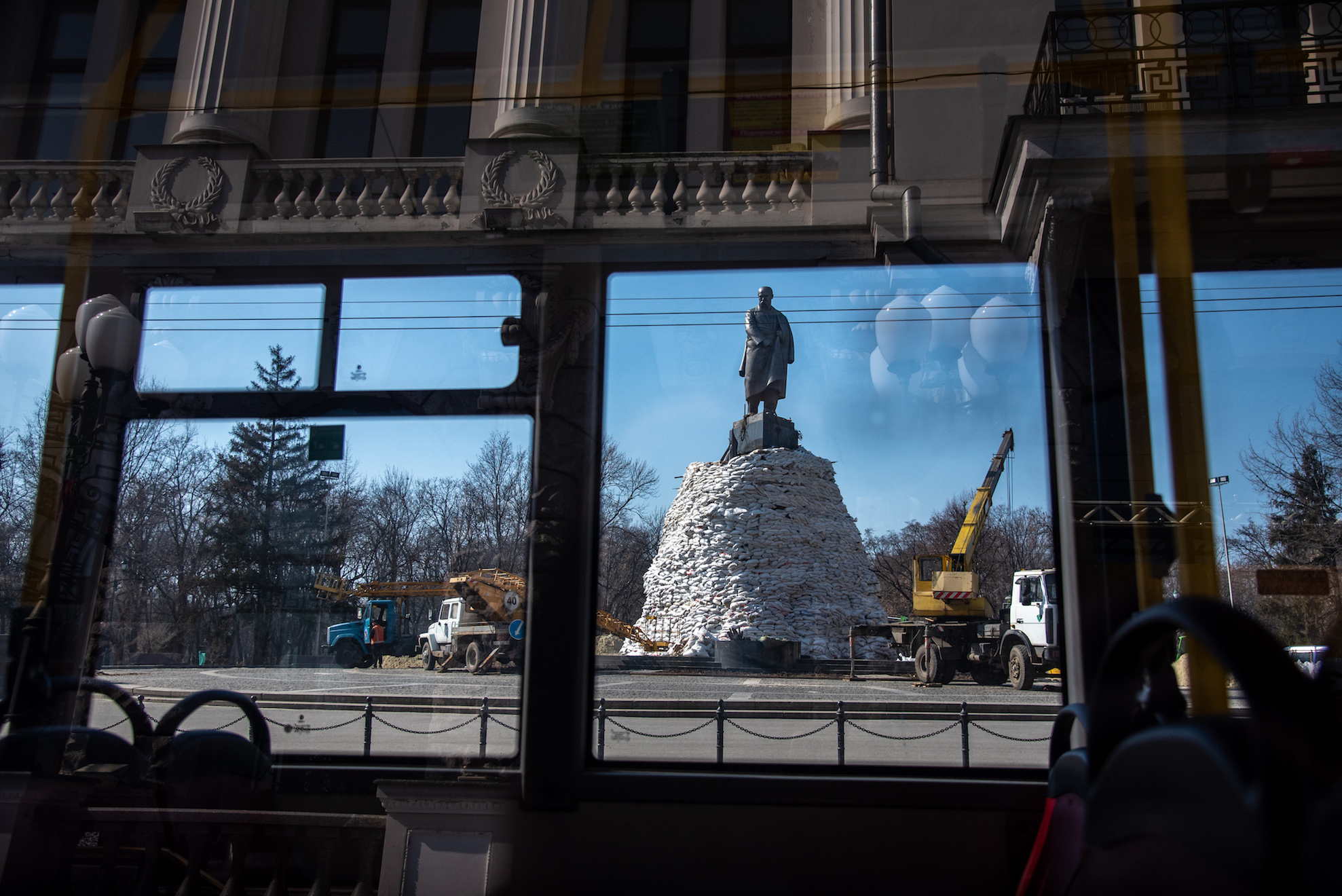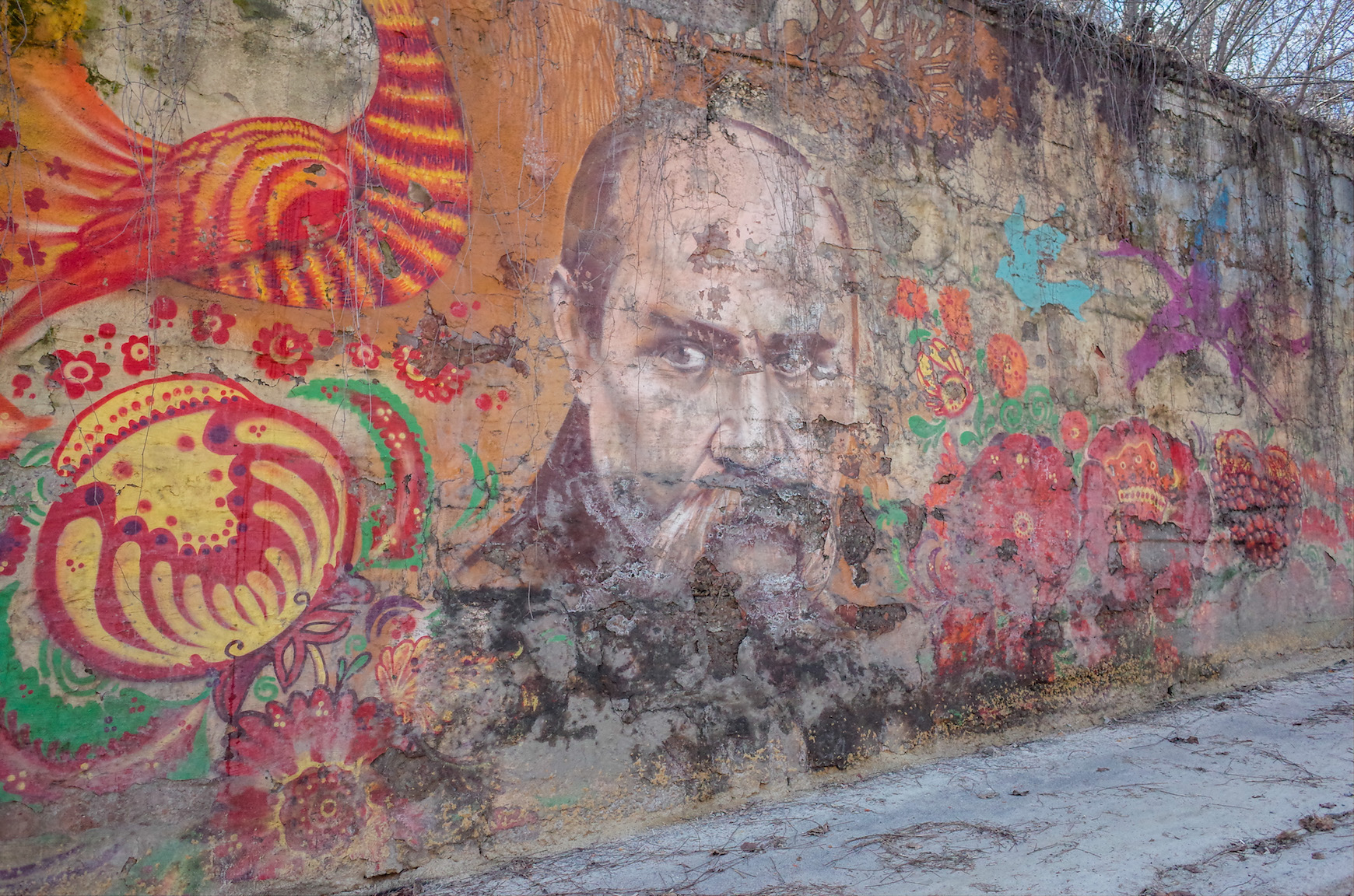In Kharkiv, residents live in terror amid Russian attack

At the entrance of Heroiv Pratsi metro station in Kharkiv, Ukraine, many people are gathered; smoking, talking on the phone or simply waiting. It seems quite normal. But below the ground, down the long stairwell, it quickly becomes apparent that there is nothing normal about this situation. After passing through the turnstiles, humidity lingers in the air, and down another stairwell, hundreds of people are living on the main platform, on the stairs themselves, and even inside immobile train cars.
They sleep on makeshift beds splayed across the cold tile. Some create living cubicles made from cardboard. Others have the small luxury of sleeping on a bench inside the parked train car. They have been here for over a month, since the war began, seeking safety from the constant bombardment by the Russians.
“Sometimes, I confuse day and night being here in the metro,” says Illyana Titova, 62, who has lived in Heroiv Pratsi since 28 February 2022. “I hope the war ends soon. I have very troubling thoughts here. Some say it will end soon, but really nobody knows.”

Illyana Titova, 62, sleeps in the Heroiv Pratsi metro station, where she has stayed since the war began.
At the start of the war, Kharkiv’s city centre was attacked ruthlessly, destroying apartment buildings and killing civilians while targeting the Ukrainian intelligence building and the Mayoral office. Since then, the Ukrainians have been able to hold a frontline northeast of the city limits.
As the Russian military begins to abandon hope in the Northern Region of Ukraine, publicly stating they will slow down aggression toward the capital of Kyiv, in the Eastern part of the country another attack looms as Russia reorganises. The Ukrainian ministry of Defense recently stated that an attack on Kharkiv is imminent.
Kharkiv, the second-largest city in Ukraine, just 25 miles from the Russian border, has strong Russian roots – everyone here speaks Russian rather than Ukrainian. Moscow assumed it as an easy target for occupation. That hasn’t been the case. Ukrainians fought back and now shells explode every day – night and day – mostly in the residential areas closest to frontlines. In fact, it is the second most bombed city after Mariupol, which has seen some 90 per cent of its building decimated. The same tactics are being deployed by the Russians: after stalling on in the combat zone, airstrikes are used to target schools, hospitals, and residential buildings, instilling fear into the civilians who decided to stay. The ones who stayed are now forced to shelter in cramped metro stations or risk their lives staying in residential buildings that have already been targeted by missiles.

A Ukrainian police officer walks through the residential Saltivka district which has been heavily bombarded.

The Heroiv Pratsi metro station in Kharkiv, where people have been sheltering for over a month.
Despite the constant threat of bombardment – the echoes of rolling thunder from airstrikes can be heard every hour – some have decided to stay in their residential buildings, even some that have already been hit.
Alexander, 57, a resident of an apartment complex in the Saltivka district in northern Kharkiv, now stays in his neighbour’s apartment after it was destroyed by a Russian airstrike. Inside his now destroyed apartment lays rubble and burnt ashes. A thin layer of dust rises as we walk across the debris. There is nothing left but a smouldered oven in his kitchen and his bathtub, which is sheltering a house plant. He shows me photos of his daughter and granddaughter with a Christmas tree inside his apartment and points to where they once enjoyed their time here.
He leads me into the adjacent apartment which is a stark contrast to his, surprisingly clean and undamaged. He sleeps here now, but on a pallet covered with cardboard. Out of respect for his neighbour, he says he will not sleep in their bed.

Residents work to protect a statue of Taras Shevchenko.

A member of the Ukrainian military examines an abandoned Russian tank in Trostyanets, Ukraine, which the Ukrainian Military just retook from Russian forces.
Throughout the district of Saltivka, many residential buildings have been struck by grad missiles and Howitzer shells. A walk through the spacious courtyards of the complexes exposes the damage done; almost every building has a corner collapsed or residue from a grad strike, all windows are smashed, glass carpeting the ground. Despite this, a few residents still walk around the area, fortifying themselves against occupiers attempting to steal their freedom and their beloved Ukraine.
Back in the city centre of Kharkiv, residents prepare for the Russian invasion. Although Ukrainian forces have been able to push the Russians from the west of the city, where the towns of Trostyanets and Okhtryka have been liberated, the assumption is that the newly prepared attack will come from the east. In the Shevchenko Gardens – the oldest green area in the city centre – workers pile sandbags around a statue of Taras Shevchenko, a Ukrainian poet, and national hero.
Shevchenko is known as the grandfather of Ukrainian literature and was a harsh critic of the Russian Empire and supporter of Ukrainian Independence. He was arrested in 1847 for using the Ukrainian language ( or “little-Russian”) to “slander” the Russian government. Shevchenko was able to return to Ukraine 12 years later in 1859. He wrote the poem ‘Testament’ while ill in 1845, which opens: “When I am dead, bury me / In my beloved Ukraine”. Today, it resonates with Ukrainians as a proud love song to their country.

A Ukrainian police officer in front of an apartment in Saltivka district that was hit with a grad missile.

A woman on her makeshift bed inside the metro.

A woman talks on the phone. She sleeps on these steps in the metro.

People living inside a parked train car at the Heroiv Pratsi metro.

The remains of an apartment which was destroyed by a Russian airstrike in Kharkiv.

An abandoned Russian Howitzer in Trostyanets, Ukraine, which the Ukrainian Military just retook from Russian forces.

A statue of Taras Shevchenko, a poet and Ukrainian hero, is being protected by sandbags.

Street art depicting Taras Shevchenko.
Follow Seth Berry on Instagram.
Enjoyed this article? Like Huck on Facebook or follow us on Twitter and Instagram.
You might like

Largest-Ever Display of UK AIDS Memorial Quilt Opens at Tate Modern
Grief Made Visible — Comprising hundreds of panels made by lovers, friends and chosen family, the UK AIDS Memorial Quilt returns in full for the first time since 1994 – a testament to grief, friendship and the ongoing fight against HIV stigma.
Written by: Ella Glossop

Green Day’s Billie Joe Armstrong tells ICE to “fuck off” in LA protest video
Saviors — The singer shared the post on Sunday, featuring the band’s recently released song ‘Fuck Off’ as its soundtrack.
Written by: Isaac Muk

In Medellín’s alleys and side streets, football’s founding spirit shines
Street Spirit — Granted two weeks of unfettered access, photographer Tom Ringsby captures the warmth and DIY essence of the Colombian city’s grassroots street football scene.
Written by: Isaac Muk

A new book explores Tupac’s revolutionary politics and activism
Words For My Comrades — Penned by Dean Van Nguyen, the cultural history encompasses interviews with those who knew the rapper well, while exploring his parents’ anti-capitalist influence.
Written by: Isaac Muk

Remembering New York’s ’90s gay scene via its vibrant nightclub flyers
Getting In — After coming out in his 20s, David Kennerley became a fixture on the city’s queer scene, while pocketing invites that he picked up along the way. His latest book dives into his rich archive.
Written by: Miss Rosen

We are all Mia Khalifa
How humour, therapy and community help Huck's latest cover star control her narrative.
Written by: Alya Mooro

